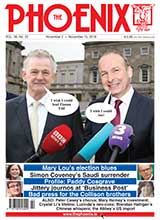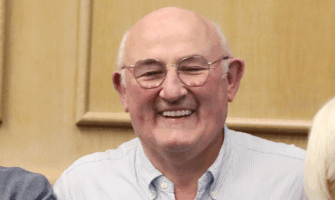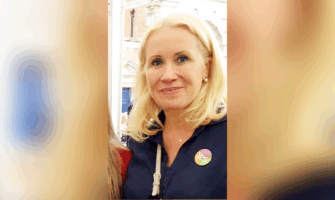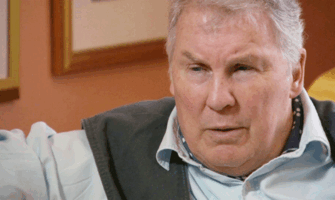
Paddy Cosgrave
Is Web Summit founder Paddy Cosgrave a tech-sector profiteer or a civic-minded altruist with his finger on the pulse of current political debate? The event organiser, who has just inked a multi-million euro deal to keep his conference in Lisbon until 2028, has blurred the edges of his public persona recently, confusing his allies and his enemies in equal measure by throwing his hat into the political arena. Happily, his outbursts on housing, corruption and freedom of speech have also drummed up plenty of publicity for his flagship conference.
Cosgrave is currently preparing for the latest edition of his Web Summit in Lisbon, which takes place next week, the third instalment of the conference since the Wicklow native announced in 2015 that he was taking his ball and decamping to Portugal. At the time of the announcement, Cosgrave was very much a government golden boy. Web Summit was a genuine Irish success story that had given taoiseach Enda Kenny the chance to speak to a global business audience and even ring the Nasdaq bell in Dublin. When Cosgrave announced his departure and released a series of emails between him and assistant secretary general at the Department of the Taoiseach John Callinan, predictably, the media – the business press in particular – poured scorn on the government’s handling of the matter.
But the incident also revealed a side of Cosgrave that has endured in the public and political sphere’s perception of him; that of a petulant, entitled and privileged young entrepreneur. This was magnified when Goldhawk revealed at the time that Web Summit had received around €935,000 from various state bodies, including Enterprise Ireland, the IDA and Fáilte Ireland (see The Phoenix, 9/10/15).
Cosgrave doesn’t take kindly to hearing the word ‘no’, whether from civil servants or co-workers. An extreme micro-manager, he was prone to the odd tantrum and had some explosive blow-outs and bust-ups with employees in the past, although it’s said he’s mellowed with age.
The relocation has certainly had its perks and the latest deal with the Portuguese government will reportedly see the company paid e11m annually for the next 10 years. The last set of accounts for Manders Terrace Ltd, the Web Summit holding company in which Cosgrave has an 81% share, show a jump in profits of nearly €2m in 2016, the first year the conference was in Lisbon. It’ll be interesting to see what another year in the Portuguese sunshine did for the coffers when the company files its 2017 accounts later this month.
Although other high-fliers – like a certain Denis O’Brien – managed to reduce their tax liabilities by shipping off to Portugal, it is not clear if Web Summit has benefitted in this sense from the move. Goldhawk asked Cosgrave if he had an interest in any companies registered outside of Ireland for tax purposes. Although the operation is headquartered in Dartry, D6, Goldhawk also asked if there were any Web Summit-related entities anchored in Portugal. Web Summit said Cosgrave was too busy to answer the questions.
Paddy’s school of salesmanship is quintessentially Silicon Valley. You know the strategy by now: talk, think about and defend the commodity you are bringing to market – an app, a mobile game, a conference – in terms of it being epoch-defining, discourse-shifting and market-disrupting. Earlier this year, before being harangued on social media into rescinding French fascist Marine Le Pen’s invite to next week’s Web Summit, Cosgrave published a blog post discussing the thinking behind the invite. “Web Summit,” he said, “ is a place where people should be prepared to have their opinions deeply challenged and in turn to deeply challenge the opinions of others.”
MARKETING CONFERENCE
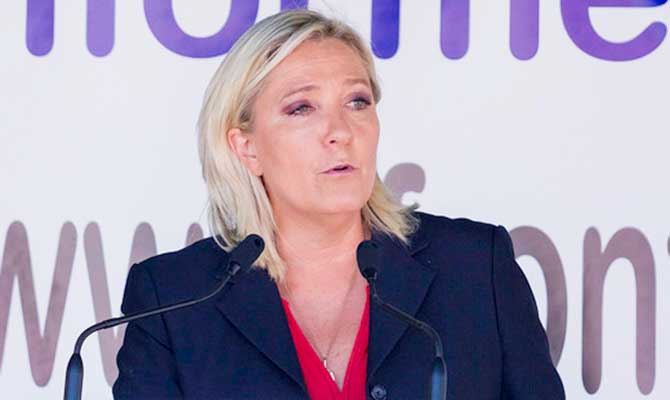
Marine Le Pen
Anyone who has been to a Cosgrave conference – and not been profoundly captured by the tech mythos – knows this is mostly empty blather. First and foremost, Web Summit is where the tech world goes to talk to itself about itself; a glorified marketing conference where the booming titans and hopeful minnows of industries that generate history-making profits go to slap each other on the back and size up the competition.
As journalist Roisin Kiberd wrote in the Ireland edition of The Times, delegates primarily pay steep prices (ranging from €550 to a whopping €25,000) to attend the conference for networking purposes, not for rigorous debate or to interrogate the pitfalls of technology. In fact, “exposure” and “networking” are two of three stated pillars of Web Summit, the third being “learning”. Add in a few politicians and celebrities like World Wrestling Entertainment superstar Paul ‘Triple H’ Leveseque and you have an unmissable annual hooley for nerds.
When short-seller Jim Chanos said earlier this year that Silicon Valley CEOs have a hyperbole problem, he took particular aim at under-fire Tesla founder Elon Musk, whose predictions for his company he described as “futuristic hype”. Web Summit is a machine for producing futuristic hype and Cosgrave its chief machinist, but that has never stopped him from presenting his product as something else entirely.
Although not Cosgrave’s own words, in its branding, Web Summit often foregrounds a quote from a 2016 Atlantic article about the conference. The Lisbon event is, according to the author, “where the future goes to be born”. This is ‘futuristic hype’ par excellence and indicative of what Cosgrave and his cohort believe about themselves.
It’s also interesting, given how critical the article is about Cosgrave’s event. Elsewhere, the author describes Web Summit as “a hyper-concentrated image of our entire world… where humanity rushes towards its extinction”.
It is difficult to pin down Cosgrave’s political convictions, but he is very invested in his public seeing him as a thoughtful, literate intellectual; an iconoclastic visionary in a jumper, not just another capitalist in a suit. His politics are a mess and he cites a mélange of influences, which run the gamut from neo-liberal economist Milton Friedman to John Maynard Keynes.
Cosgrave has tweeted a picture of four thinkers, who have pride of place on his office wall and who have, he says, shaped his thinking more than anyone else. His Mount Rushmore includes anarchists Noam Chomsky and Mikhail Bakunin, ‘people’s historian’ Howard Zinn and philosopher (and socialist) Bertrand Russell.
Separately, he has praised Solidarity TD Paul Murphy, but declared that he is not himself a socialist and elsewhere said that he “couldn’t disagree more” with the libertarianism of Silicon Valley magnate Peter Thiel.
As the pendulum has swung away from the government on housing and homelessness and as the roles of tech companies like AirBnB have been brought into spotlight, Cosgrave has ramped up the pseudo-leftist rhetoric. It will be recalled that he weighed in on the Take Back the City protests recently, much to the chagrin of the occupiers (see The Phoenix, 20/9/18). In a paid-for ‘promoted’ tweet, Web Summit begged the question: “Does rent in Ireland seem out of control?” It also claimed that “many of our team” would be at Take Back the City’s National Day of Action.
Responding to one activist, an indignant Cosgrave defended his record and said that he had made his feelings known about AirBnB in the past and he shared a tweet from earlier this year. In that particular tweet, alongside a weak-tea critique of one of their adverts, Cosgrave had described himself as “a big fan of AirBnB” and called its founders “visionary” before launching into an anecdote about having dinner – “in Vegas” of course – with former Goldman Sachs president Gary Cohn. Last week, he applauded the government’s new short-term let regulations and said “it should likely be welcomed.”
Cosgrave often fails to grasp that he’s usually the wrong person to make a particular point and his forays into social criticism can come across as half-baked at best or even hypocritical.
Take his discussion last week about elitism in Irish education. Having appeared on Eamon Dunphy’s podcast, where he talked about income and wealth inequality in Ireland, Cosgrave tweeted about the European Commission’s assessment that Ireland’s second-level education system is the most elite in Europe. Of course, Cosgrave would know all about that. He attended Glenstal Abbey, one of the most expensive private boarding schools in the country, where fees start at nearly €12,000.
At times, Cosgrave has seemed to cheerlead this kind of educational elitism. In 2014, he was pilloried when Web Summit announced it would only recruit graduates who got a 2.1 degree from Trinity or a first-class honours degree from the other Irish institutions. He defended the policy at the time by saying that he was merely highlighting “grade inflation” at other Irish universities but, in classic Cosgrave fashion, he alienated as many people as he convinced. Even the Higher Education Authority had to release a statement distancing itself from his comments.
PUBLIC LIFE
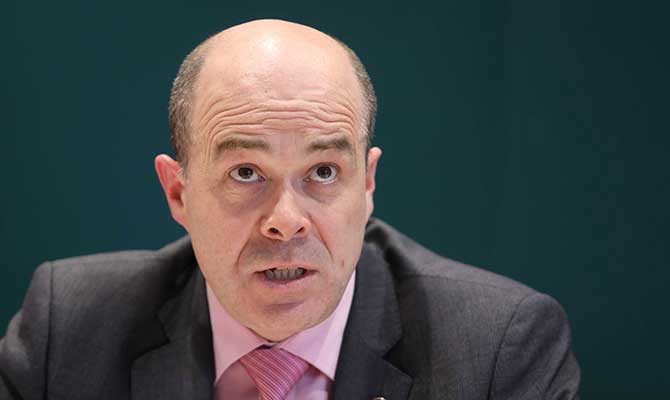
Denis Naughten
When Cosgrave first came on the radar, Goldhawk had him pegged as a future politico (see The Phoenix, 18/5/07). His first foray into public life was as the founder of Ireland’s very own Rock the Vote (RTV) campaign a high-profile effort to get the youth vote out, in the run up to the 2007 general election. It showcased some of his best attributes, including his organisational skills and his preternatural self-promotional talents.
But as an attempt to graft a purely American, celebrity-obsessed campaign (RTV in the US was anti-George Bush, while Cosgrave’s iteration was strictly non-partisan) on to the Irish political scene, it was derided by certain begrudgers as vapid and naff. What could possibly be considered naff about getting beige TDs like the Green Party’s Ciarán Cuffe and Progressive Democrat’s Fiona O’Malley to don guitars and leather jackets for photo opps with models dressed as ‘rock chicks’ from Jules Fallon’s First Option agency?
Goldhawk wasn’t the only one who saw Paddy as a political animal. As president of The Philosophical Society (The Phil) in Trinners, he was responsible for inviting big-name guests, taking credit for bringing the likes of Archbishop Desmond Tutu, US Senator John McCain and even porn star Ron Jeremy to Trinity’s hallowed halls. He was instrumental in the then 150-year-old debating society developing the on-campus nickname Celeb Soc. One such guest was Bertie Ahern, who remarked to a packed chamber that he had been reliably informed “that within the inner sanctum of the Phil, your eminent president, Mr Patrick Cosgrave, is hotly considered to become a future Taoiseach”.
Around the time of RTV, Paddy set up a candidate information site called micandidate.ie, which provided a free service to hopeful politicians. Two years later, in anticipation of the local and European elections in 2009, Cosgrave ‘pivoted’ and monetised the website. Alongside a free basic package, it offered a pricey €239 MiCandidate Pro service, which, among other things, claimed to give candidates access to something called Obama Tools – including some free services like YouTube, Gmail and Twitter – at a time when politicians were mostly technologically illiterate.
He ran into a spot of bother, however, when during an interview with journalist Mark Coughlan, he claimed that MiCandidate had a licensing arrangement with the Irish Times. No such agreement existed and Cosgrave was left with egg on his face when the IT set the record straight (see The Phoenix 17/6/11).
That the mainstream media loves to talk to Cosgrave is somewhat understandable, given the success of his company and the bombastic statements he has made over the years. The Wicklow native just makes for good copy. The reading public, however, might wonder why they have to be treated to even the most tiresome of the businessman’s brain dumps. Recently, Sunday Business Post hack Francesca Comyn, as part of a two-page spread on Cosgrave, shared his “revisionist theory” that Catholicism, far from being a “badge of rebellion under British rule… was actively sponsored by imperialist interests in the 19th century as a means of suppressing dissent”.
Last year, he summoned the press to a conference in the Shelbourne Hotel, ostensibly to officially launch his fintech conference Moneyconf, which he had announced was coming to Dublin. There, the conference organiser did his best Eliot Ness impression, lashing out at corruption in Ireland, urging the government to pass anti-corruption legislation and claiming that he had first-hand experience of it in Irish life. That particular flight of fancy was given as much prominence by journalists like IT business reporter Charlie Taylor as the event launch itself. It was an excellently timed outburst and indeed Cosgrave is a master of drumming up free publicity for his efforts by making statements like this.
Recently, Goldhawk had the pleasure of attending a Web Summit press conference at the company’s HQ. Cosgrave was there to formally announce his new deal with the Portuguese government, but he couldn’t resist taking a swipe at soon-to-be-sacked communications minister “Denis ‘the Idiot’ Naughten”. In an uncharacteristic display of restraint, the media declined to bite and the comment was neither explored further nor covered. Perhaps he’s losing his touch.
Cosgrave certainly isn’t losing his touch when it comes to attracting big-name guests. Next week’s Web Summit will see the likes of Brazilian football star Ronaldinho, World Wrestling Entertainment’s chief brand officer Stephanie McMahon and World Wide Web inventor Tim Berners-Lee grace the stage at the Altice Arena. Meanwhile, Paddy’s public emissions on housing have also paid off. He has just been named as a keynote speaker at a social policy conference organised by do-gooders Social Justice Ireland later this month.
It might yet be too early to rule out Paddy’s political ambitions.



